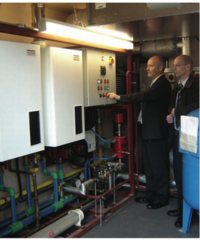Boiler room is designed around prefabricated heating module

Engineer’s pipe dream — the new boiler room for the extended diabetes centre at Ipswich Hospital was designed to match the dimensions of this Paraskid prefabricated heating module form Potterton Commercial.
A skid-mounted prefabricated heating module installed in a new plant room at Ipswich Hospital has proved so cost and time effective that Robert Diamond, the senior mechanical engineer and consultant on the project says, ‘I have never specified a prefabricated heating solution before, but the [Potterton Commercial] Paraskid ticked all the right boxes for the Ipswich Hospital projects. It was both cost and time effective, and I would not hesitate to used a prefabricated heating solution again, whether for a new-build or refurbishment project.’ The diabetes centre at the hospital was more than doubled in size in 2006 to 636 m2, and the existing heating system did not enough capacity. Robert Diamond explains, ‘As the hospital extension was to have a completely new plant room, commissioning and designing the installation to fit in with the prefabricated module was simple. The boiler room was designed to match the dimensions of the Paraskid, offering a neat and tidy installation.’ The module included to 80 kW Paramount condensing boilers and serve an underfloor heating system. The module also includes a control panel, pressurisation set, expansion vessel, modulating pumps, dosing pot, condensate neutralisation and all pipework headers.
Related links:


